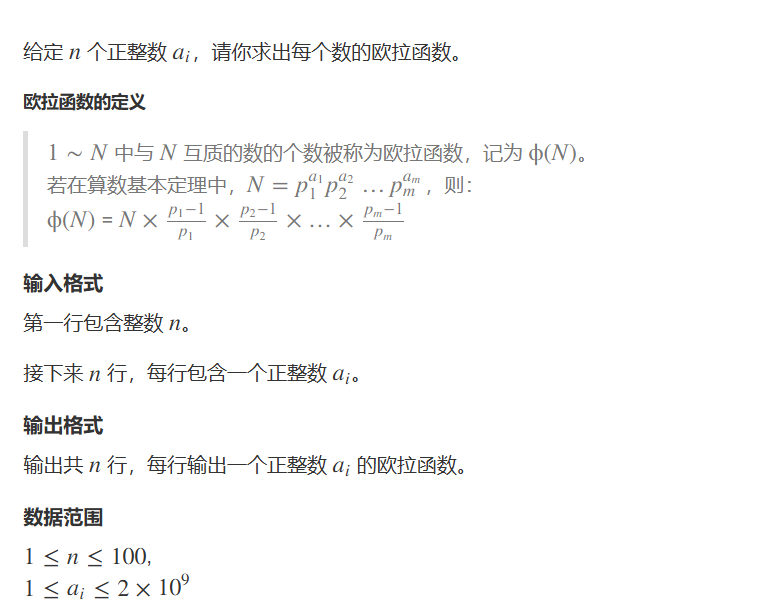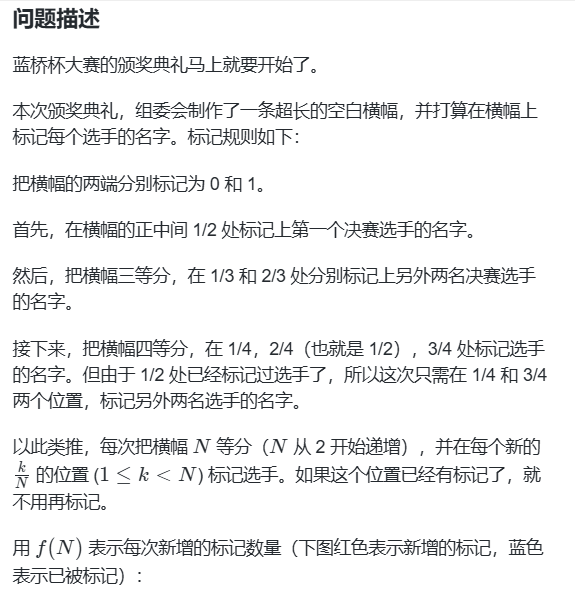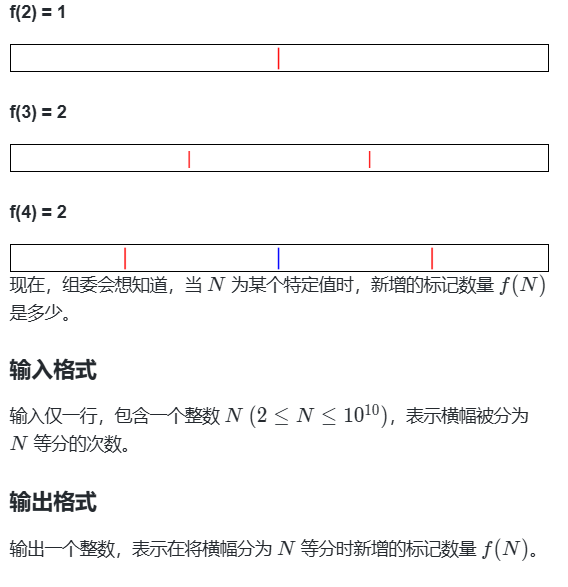
欧拉函数就是求解1~n之间与n互质的数的个数
一、求单独n的欧拉函数
import java.util.*;
public class Main {
static int n;
public static void main (String[]args) {
Scanner sc = new Scanner(System.in);
n = sc.nextInt();
while (n -- > 0) {
int a = sc.nextInt();
OLA(a);
}
}
static void OLA(int a) {
int res = a;
for (int i = 2; i <= a / i; i++) {
if (a % i == 0) {
res = res / i * (i - 1);
while (a % i == 0) {
a /= i;
}
}
}
if (a > 1) res = res / a * (a - 1);
System.out.println(res);
}
}
例题


对于f(n)想要求解所增加的个数,设n分块为i/n (i = [1, n)),先假定如果gcd(i, n) != 1就一定在n的前面出现过i/n(上下除去gcd(i, n))
证明:
首先有gcd(i, n) > 1,下面记gcd为g, 那么有n / g < n, i / g < i,因此i/n在f(n/g)的地i/g的位置出现了
对于本题
只需要求解gcd(i, n) == 1的情况,也就是求1~n之间与n互质的数的个数,欧拉函数求解即可
#include <iostream>
#define LL long long
using namespace std;
LL n;
int main()
{
cin >> n;
LL ans = n;
for (int i = 2; i <= n / i; i++) {
if (n % i == 0) {
while (n % i == 0)
n /= i;
ans = ans * (i - 1) / i;
}
}
if (n > 1) {
ans = ans * (n - 1) / n;
}
cout << ans;
return 0;
}
二、求解前n位的欧拉函数(前n项欧拉函数之和)
线性筛法求欧拉
/*
变量解释:
phi[i]:OL(n)
primes[i]: 第i个素数
st[i]: 是否为素数,true为否,false表示为素数
*/
static void getOLs(int n) {
phi[1] = 1;//特判
for (int i = 2; i <= n; i++) {
if (!st[i]) {
phi[i] = i - 1;//i为素数,则1~i之间与i互素的个数为i - 1
primes[idx ++] = i;
}
for (int j = 0; primes[j] <= n / i; j++) {
int pj = primes[j];
st[pj * i] = true;
if (i % pj == 0) {//pj为i的最小质因子
/*
那么pj也是pj * i的最小质因子,因此(1 - 1 / pj)
这一项就已经在phi[i]中计算过了(因为pj是i的最小质因子)
因此只需要补齐基数即可,将N修正回来
*/
phi[pj * i] = phi[i] * pj;
break;
}
/*
这是pj不是i的最小质因子情况,那么pj是pj * i的最小质因子,这样phi[pj * i]
就比phi[i]要多了基数的pj倍,还多了pj质因子的贡献:
(1 - 1 / pj)
也就是phi[pj * i] = phi[i] * pj / pj * (pj - 1);
化简:
*/
phi[pj * i] = phi[i] * (pj - 1);
}
}
}

